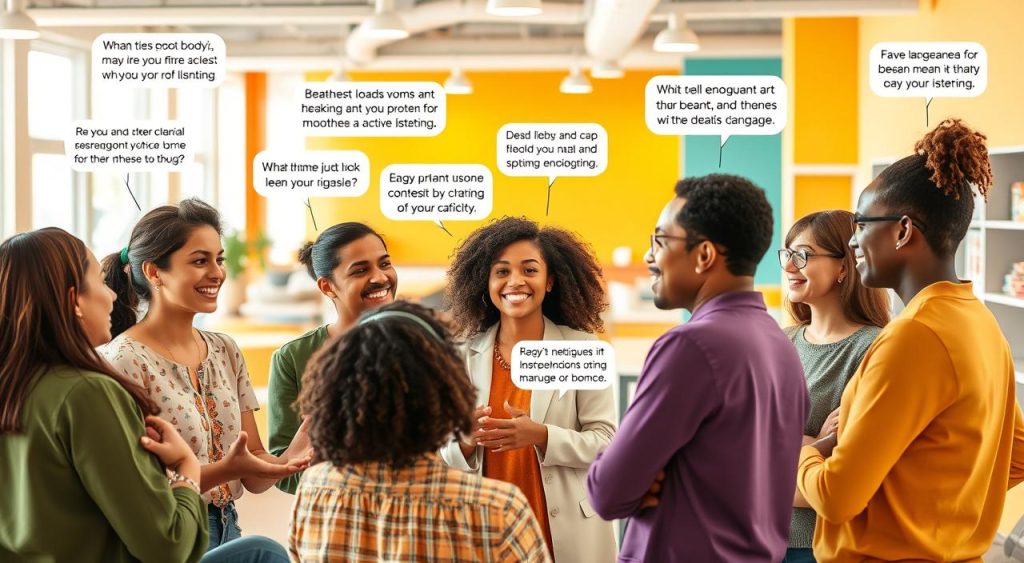In today’s job market, 93% of employers say soft skills are crucial for moving up in your career. They are more important than technical skills when they decide who to hire. These skills are the backbone of professional growth and success in education and work.
While hard skills get you the job, soft skills help you excel. They help you build strong relationships, solve tough problems, and keep learning. This is how you truly succeed in your career.
Soft skills are now what set you apart in the job market. They are essential for creativity, communication, and innovation. They make you a valuable asset in any field.
In this section, we explore how soft skills improve your career and education. They turn you into a sought-after expert. They also increase the value of learning in any field.
Understanding Soft Skills in the Professional Environment
In today’s fast-paced workplace, soft skills are more important than ever. They help with communication, teamwork, and achieving goals. These skills are key for growing your career and finding better jobs.
Defining Soft Skills and Their Importance
Soft skills are not about technical skills but how you work with others. They cover how you interact, solve problems, and manage tasks. These skills are vital for success, improving work environment and productivity.
Skills like communication, teamwork, and problem-solving are essential. They make employees perform better and feel more satisfied.
Soft Skills vs. Hard Skills: A Comparative Analysis
Hard skills are specific to a job and learned through education or training. Soft skills, however, are more general and important across many jobs. Hard skills get you the job, but soft skills help you succeed.
For example, a software developer needs coding skills for their job. But they also need teamwork and communication skills to work well with others and achieve project goals.
The Impact of Soft Skills on Team Dynamics
Skills like empathy, communication, and leadership change how teams work together. They make interactions smoother, build respect, and encourage teamwork and creativity. Teams with strong soft skills can handle challenges better, helping everyone grow professionally.
Improving skills in the workplace benefits both individuals and the company as a whole.
| Soft Skill | Impact on Career Development | Examples of Application |
|---|---|---|
| Effective Communication | Increases clarity and efficiency, fostering better relationships | Presentations, Meetings, Emails |
| Leadership | Drives team performance and innovation | Project Management, Team Motivation |
| Problem Solving | Enhances the ability to navigate complexities and uncertainties | Conflict Resolution, Strategic Planning |
| Teamwork | Boosts overall productivity and job satisfaction | Collaborative Projects, Team Retreats |
Top Soft Skills Desired by Employers
In today’s job market, employers look for more than just technical skills. They want soft skills too. These skills are crucial for career advancement and professional growth. They greatly impact a candidate’s chances of getting hired.
Let’s look at some of the most wanted soft skills. These skills make a person more attractive to employers.
- Adaptability
- Communication
- Teamwork
- Problem-solving
- Creative thinking
These skills are vital for success in any job. Employers love adaptability because it shows a worker can handle change. This is key in today’s fast-paced work world.
Good communication and teamwork are also key. They help teams work well together. This leads to success and more chances for professional growth.
| Soft Skill | Importance in Career Advancement | Impact on Job Prospects |
|---|---|---|
| Adaptability | High | Positive |
| Communication | Essential | Critical |
| Teamwork | Important | Strong |
| Problem-solving | Highly valued | Beneficial |
| Creative Thinking | Critical | High |
The data shows how important soft skills are. They boost job prospects and help with career advancement. It’s key for professionals to work on these skills to meet their field’s demands.
Improving Communication: A Foundational Soft Skill
Mastering communication is more than just speaking well. It’s about understanding and using both words and body language. This skill is key for career growth and getting along with others. Whether you’re in a meeting or chatting with someone, clear communication is crucial.
Effective Verbal and Non-Verbal Communication Techniques
Verbal communication is not just about what you say. It’s also about how you say it. Using a clear tone, emphasizing important points, and pausing at the right time can make a big difference. At the same time, your body language, facial expressions, and eye contact should match what you’re saying.
Active Listening and Its Role in Career Success
Being an active listener is vital for career success. It helps you understand and build trust with others. It’s not just about hearing words, but also about getting the whole message. This skill improves teamwork and opens up new career paths by helping you solve problems and resolve conflicts.

To use these techniques well, here’s a list of skills and how they apply in different work situations:
| Communication Skill | Technique | Application |
|---|---|---|
| Verbal | Clarity and Conciseness | Pitch presentations, Client meetings |
| Non-Verbal | Positive Body Language | Networking events, Team interactions |
| Active Listening | Feedback and Paraphrasing | One-on-ones, Performance reviews |
By using these communication techniques regularly, professionals can improve their impact and efficiency. Every interaction becomes a chance to learn and grow, both personally and professionally.
Emotional Intelligence in Leadership and Management
In today’s fast-paced work world, emotional intelligence (EQ) is key for leaders. It helps in making better decisions and growing in your career. EQ is about understanding and using your emotions well.
Understanding Emotional Intelligence Components
EQ has five main parts: self-awareness, self-regulation, motivation, empathy, and social skills. These parts help leaders know themselves and connect with others. They are important for team success and achieving goals.
Applying Emotional Intelligence in Decision-Making
Using EQ in decision-making makes leaders better. It helps create a work place where everyone can grow. Leaders with EQ make smart choices that consider feelings and facts.
By using EQ every day, managers can solve problems better. They can help their teams reach their goals. This helps everyone in the company grow professionally.
| EQ Component | Role in Leadership | Impact on Decision-Making |
|---|---|---|
| Self-Awareness | Enables understanding of personal strengths and weaknesses | Improves clarity in choices, enhancing strategic alignment |
| Self-Regulation | Assists in maintaining control and adapting to new situations | Supports balanced and fair decision-making |
| Motivation | Drives to achieve beyond expectations and inspire others | Promotes persistence and ethical decision-making |
| Empathy | Helps understand and consider team members’ feelings and perspectives | Leads to inclusive and supportive team decisions |
| Social Skills | Facilitates effective communication and conflict resolution | Enhances teamwork and operational efficiency |
Having an emotionally intelligent leadership style is vital. It helps navigate today’s work world and achieve long-term success in your career.
Problem Solving and Creativity as Career Enhancers
In today’s job market, skills like problem solving and creativity are key. They help advance career development and boost job prospects. These skills are in high demand across many industries.
Problem solving and creativity are essential in every field. They help turn ordinary employees into outstanding ones. In tech and healthcare, for example, innovative thinking can make a big difference.
- Good problem solving makes tasks more efficient and saves money.
- Creativity opens up new opportunities for growth, crucial in today’s fast business world.
Improving these skills can lead to big career gains. Employees who think creatively and analytically get promoted faster and earn more. This shows how important these skills are for career growth.
Developing problem solving and creative skills can also improve your job performance. This makes you more employable and helps sustain your career. Taking part in training on these skills is a smart move for career advancement.
To make the most of these skills, it’s not just about learning them. You must also show how you apply them in your work. This way, you contribute to better productivity and innovation. It leads to better job prospects and career growth.
Cultivating a Growth Mindset for Professional Growth
Having a growth mindset is key for personal and professional growth. It helps you keep learning and improving skills, which boosts your career. Let’s explore what makes this mindset work.
Lifelong Learning and Skill Enhancement
Staying updated with new industry trends and tech is vital. It’s the foundation for improving your skills. By focusing on learning, both in school and outside, you grow professionally. This opens doors to many career opportunities.

Adapting to Change and Overcoming Challenges
Being able to adapt shows your strength and is part of a growth mindset. Overcoming obstacles makes you stronger and more adaptable in your career.
| Challenge | Strategy | Outcome |
|---|---|---|
| Technological Advancements | Regular training sessions | Enhanced technical proficiency |
| Economic Shifts | Adaptive business strategies | Stable career progression |
| New Leadership | Engagement and feedback | Improved intra-team dynamics |
Collaboration and Teamwork in Diverse Workplaces
In today’s global business world, teamwork in diverse workplaces is key for career development and learning opportunities. When team members with different backgrounds work together, they come up with new ideas and succeed. This shows how valuing differences can lead to great results for everyone, making the workplace better.
To build strong teams in diverse settings, we need skills like communication, empathy, and respect for everyone. These skills make teams work better and help everyone grow personally and professionally. They lay the groundwork for ongoing improvement and lasting success.
| Benefits of Teamwork | Key Soft Skills for Collaboration |
|---|---|
| Enhanced problem-solving through diverse perspectives | Communication |
| Increased innovation and creativity | Empathy |
| Better decision making | Adaptability |
| Improved employee satisfaction and retention | Respect for diversity |
As companies see the value of diversity in teamwork, they start training on important soft skills. These efforts help with career development and learning opportunities inside and outside work. Companies that focus on teamwork in diverse settings see better productivity and happier employees.
- Workshops on intercultural communication
- Team-building retreats focused on empathy and cooperation
- Ongoing training sessions on adapting to diverse working styles
By fully embracing diversity in teams, organizations can tackle global challenges more effectively. This creates a culture that supports both personal growth and team success.
Navigating Conflict Resolution with Tact and Diplomacy
In today’s diverse workplaces, knowing how to solve conflicts is key. It helps with professional growth and job chances. Using tact and diplomacy means more than just solving problems. It’s about creating a place where everyone’s voice is heard and valued.
The Role of Negotiation Skills in Conflict Resolution
Negotiation is crucial in solving conflicts. It’s about talking to find a solution that works for everyone. This skill keeps relationships strong and opens doors for future teamwork, helping your career grow.
Mediation Techniques for Maintaining Workplace Harmony
Mediation is a neutral way to find a solution. An impartial third party helps find a fair answer. Good mediation means listening, understanding, and finding creative solutions to conflicts.
Here are some key tactics for using negotiation and mediation to solve workplace problems:
- Active Listening: Listening well to others can prevent misunderstandings and build respect.
- Emphasis on Common Goals: Focusing on what everyone wants helps move past personal differences.
- Encouraging Open Dialogue: Letting everyone speak reduces tension and helps understand different views.
A table shows the difference between negotiation and mediation. It helps us see when to use each:
| Technique | When to Use | Benefits |
|---|---|---|
| Negotiation | When direct conflict arises between parties on specific issues | Directly addresses the issue, often leading to quicker resolution |
| Mediation | When ongoing relationship needs to be preserved | Creates a safe space for open dialogue, preserving relationships |
Using these strategies helps solve disputes and improves how we deal with complex situations. It makes for a better work environment, helping your career and job chances.
Education and Career: Integrating Soft Skills into Academic Programs
The world of education and career is changing fast. Now, soft skills are being added to academic programs and vocational training. Schools are updating their courses to help students succeed in today’s jobs.
Vocational Training and Soft Skills Development
Vocational training is leading this change. It’s teaching skills like teamwork, problem-solving, and communication. This way, students learn both technical skills and important soft skills for their future careers.
Job Prospects Boosted by Behavioral Competencies
Adding soft skills to education makes students more attractive to employers. These skills are as important as technical ones. Students with a mix of skills do better in the job market, showing the value of this approach.
Conclusion
We’ve shown how important soft skills are for better teamwork and personal growth. They are key in professional development, unlike hard skills that just get you a job. Soft skills like communication and emotional intelligence are crucial for success.
As work changes, learning new things is vital. Adding soft skills to education helps students fit well into the job world. They learn to use their knowledge in real-life situations.
Our look at soft skills shows they’re as important as technical skills. Focusing on both will help you succeed in today’s fast-changing job market. Think about your skills, find areas to improve, and keep learning. With soft skills, your career can really take off.



